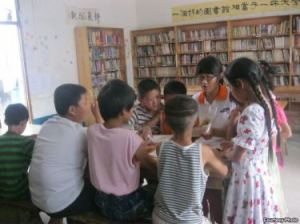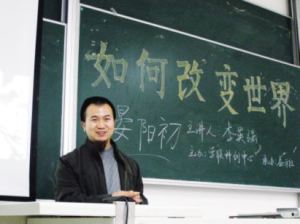By Song Zhibiao, published: November 17, 2014
Editor’s update: Liren Rural Libraries announced its closure on September 18, 2014.
The Liren (literally: “cultivating talents”) Rural Libraries, which is devoted to aiding rural students to broaden their reading horizons and expand their learning opportunities, has met with the worst crisis since its founding. Its official Weibo revealed that, at the end of August, eleven Liren Rural Libraries, one after another, have undergone official reviews by such local agencies as the Education Bureau, the Culture Bureau, and the Culture and Sports Bureau. Two of the libraries have already been notified by their partner schools that the schools were terminating their cooperation with the libraries.
In additional comments, Li Yingqiang (李英强), who previously served as a responsible person for the Liren Rural Libraries, said: “In 2011, they closed one library; in 2012, five; and in 2013, three. We didn’t fight back for our rights, nor did we cry foul. We just continued operating libraries where we could. From 2014 to the present, they have already closed five libraries.” This, I’m afraid, may not be the end of the matter, and the Liren Libraries should perhaps prepare themselves for dissolution.
As an educational public service organization, Liren had earlier been questioned about another of its projects — study tour summer camps. These summer camps organize young students to go on study tours, and they employ scholars as guidance counselors. As such, these summer camps have been well received. Soon after their formation, however, they found themselves in trouble and were forced to adjust their program in light of government surveillence.
Several years after public service organizations flourished, they are now becoming sensitive targets subjected to government review. Through territorial jurisdiction and the division of government duties, the government has developed comprehensive means to keep tight control over the public service NGOs. Through qualification review and then through monitoring their sources of funding and their activities, all types of public service organizations are being watched and controlled, be they NGOs with government backing or grassroots organizations not associated with the government system.
Since this year, special reporting requirements have been set up for public service organizations that obtain foreign funding, invite foreign guests, and so on. Based on the logic of the official reviewers, public service organizations are channels by which foreign forces enter China. By assuming these foreigners have ulterior motives, the reviewing officials treat them as enemies; and the reviews deter the development of these public service organizations. As this model of government control continues to expand, an organization such as Liren Library, that embraces ideals of social improvement, bears the brunt of the official reviewers’ suspicions.
In the eyes of government monitors, who see enemies everywhere, the ideals that the Liren Rural Libraries cherish are incomprehensible, and its modus operandi is even more suspicious. Beyond the control of the educational authorities, Liren convenes students of all ages, thus breaking an old taboo. The guidance counsellors who take the students on study tours are mostly liberal intellectuals who influence the students with new ideas that are likely to provoke a backlash from the government’s brainwashing apparatus.
The Liren Rural Libraries are ensconced in towns and schools where volunteers are recruited to perform routine maintenance, instead of handing the libraries over to the schools to be the custodians. This of course is seen by the inflexible education officials as precisely the type of action taken to invade their sphere of influence. When one Liren Library was in trouble and investigated by the government, it would cause other Liren Rural Libraries elsewhere to be subjected to similar scrutiny by local governments, thus placing the entire Liren project on a very shaky footing.
During these past few years during which Liren has come under hostile government scrutiny, Liren has kept a low profile. Liren’s move to take corrective action in accordance with government requirements, moreover, is one reason that Liren has been able to continue its activities for a period of time. But as the work of public service NGOs is increasingly politicized, Liren’s setbacks are not entirely unexpected. We can very well expect that, sooner or later, Liren will have to cease its programs altogether due to the ever-tightening grip of government repression.
After taking measures to eradicate the “seven perils” [ideas perceived by the communist party to be subversive to its rule], various sectors and fields have all engaged in self-review and self-correction against such warnings. They have also quickly formed mechanisms for stability maintenance based on each sector’s characteristics, and between them, they have quickly formed a grid network of surveillance. With its ideological stand and its operation model that greatly challenge the existing order of education that aims at conforming to the communist ideology, Liren Rural Libraries is bound to find itself mired in difficulties.
The series of premeditated government harassments against Liren Rural Libraries in recent weeks further proves that the path of using civil society as a moderating force to change China is also short-lived and dead-ended. As for those organizations whose main mission is to advocate ideas, they are seen as a direct ideological threat, and their survival is even more precarious.
That the public service NGOs in China are no exception to government suppression is not pessimism, but a fact.
Because of this fact, the public service sector will become even more divided; boundaries of public service will be more clearly defined; avoiding challenging the existing political authorities will be accepted and observed as a rule for survival. This harsh environment will force public service organizations to adjust and adapt. Those unwilling to compromise will perish.
Having not enjoyed a spring, public service organizations in China now find themselves in deep winter, and a large part of the public domain, which is weak in China to begin with, has thus collapsed.
Related:
Rural Library Chain Closes, Citing ‘Tremendous Pressure’, the New York Times sinosphere blog, September 22, 2014.
Official website of Liren Rural Libraries is still live.
Song Zhibiao (宋志标) was a commentator with the Southern Metropolis Daily in Guangzhou and has been well-received for his commentaries on current affairs in China until May 2011. He is now an independent commentator and, by self-description, a media watcher.
(Translated by Ai Ru)



